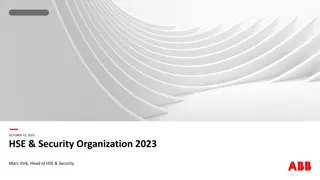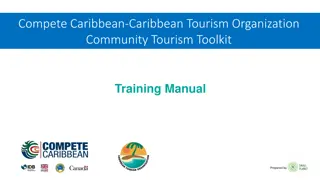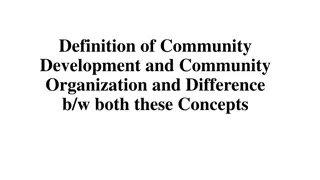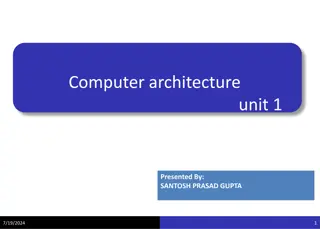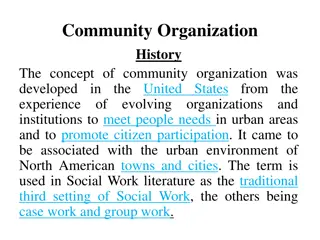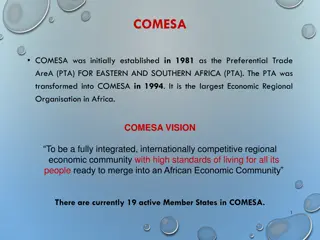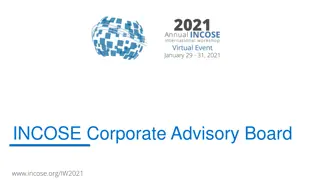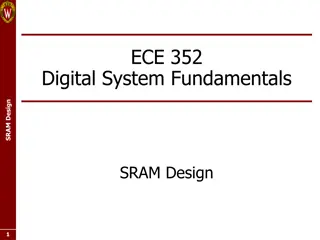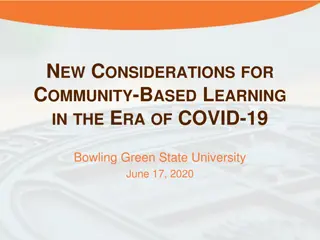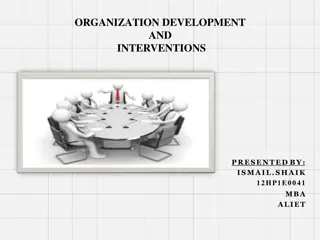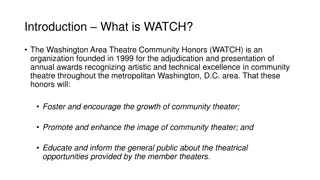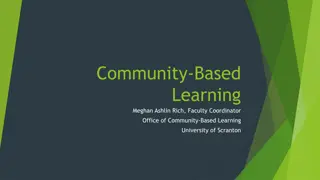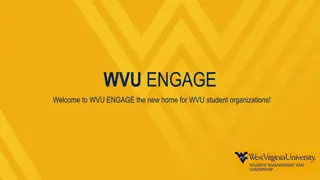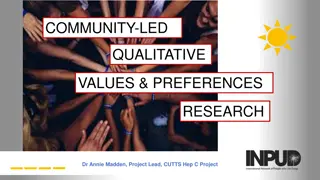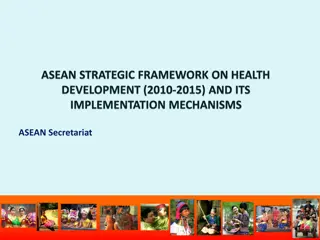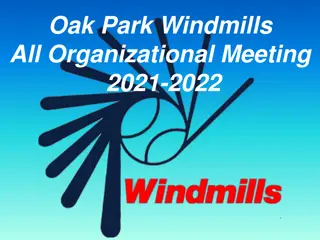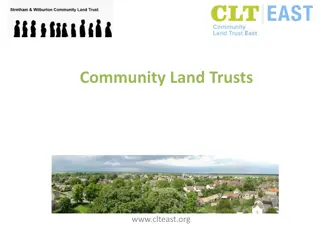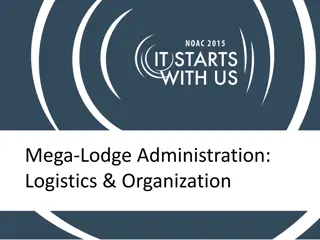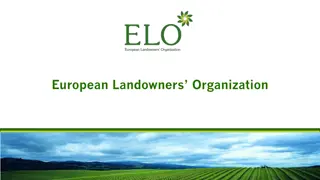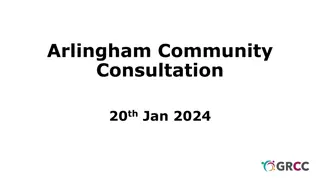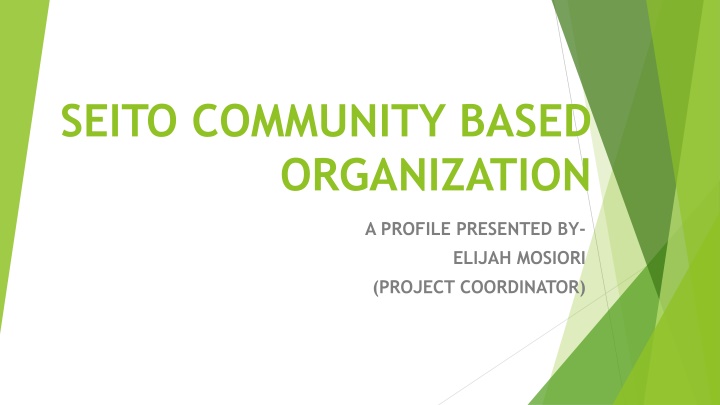
Overview of Seito Community-Based Organization
Seito Community-Based Organization, founded in 2006 and located in Trans-Nzoia county, Kenya, aims to empower the community through HIV/AIDS mitigation, human rights advocacy, and environmental protection. Learn about its formation, mission, values, and outreach programs led by Elijah Mosiori, the project coordinator.
Download Presentation

Please find below an Image/Link to download the presentation.
The content on the website is provided AS IS for your information and personal use only. It may not be sold, licensed, or shared on other websites without obtaining consent from the author. If you encounter any issues during the download, it is possible that the publisher has removed the file from their server.
You are allowed to download the files provided on this website for personal or commercial use, subject to the condition that they are used lawfully. All files are the property of their respective owners.
The content on the website is provided AS IS for your information and personal use only. It may not be sold, licensed, or shared on other websites without obtaining consent from the author.
E N D
Presentation Transcript
SEITO COMMUNITY BASED ORGANIZATION A PROFILE PRESENTED BY- ELIJAH MOSIORI (PROJECT COORDINATOR)
DEFINITION The Word SEITO is from the Kisii language which means our home , our place or our community
VISION: A Healthy, Empowered Community MISSION: To Empower The Community With knowledge And Skills For Improvement of livelihoods. VALUES: Transparency and Teamwork BELIEF: We have the ability to positively transform lives.
PREAMBLE Seito community based organization is a non-profit entity working in Trans-Nzoia county with government of Kenya structures, local and international Non-Governmental organizations on mitigation of HIV/AIDS, promotion of human rights advocacy and protection of the environment.
FORMATION The organization was founded by ten members in the year 2006 and registered with the Government as a Self Help Group in 2007. The group broke up barely two years after its formation. This was because the members were discouraged since they did not meet their objective of assisting each other financially within the ten-month time frame they had set.
In 2008 I was trained as Trainer of Trainers(TOT) on HIV/AIDS management by the Adventist Development and Relief Agency (ADRA). The three week workshop inspired me so much that when I returned home, I motivated the disbanded group members to reunite and do voluntary work. I recruited other members and we were a team of 21people - 12 females and 9 males. With ADRA s support, I trained the 20 people as counsellors, offering basic counselling services to people living with HIV (PLHIV)
OUTREACH PROGRAMMES We started mobilising the community on HIV/AIDS prevention. We did outreach programmes in schools, churches, civil society organizations and at public meetings. We became so famous that the Ministry of Health rewarded us by training ten of the group members- two in each of the following. Community mobilization for HIV/AIDS ii. Home Based Care (HBC) iii. Post exposure prophylaxis(PEP) iv. Antiretroviral Therapy (ART) adherence counselling v. Post Rape Care (PRC) i.
With the knowledge and training skills gained, we were able t reach over twenty four thousand people giving them different kinds of help as shown below. NO. SERVICE NO. OF PEOPLE i ii ART adherence counselling to PLHIV and their caregivers Home based care (PLHIV), Home based care skills to caregivers HIV/AIDS prevention messages Post rape care messages (especially to school children) Post exposure prophylaxis messages 1,367 229 370 10,120 5,400 3,000 iii iv v vi Referral to health facilities for diverse services e.g HIV testing and counselling, Prevention of mother to child transmission (PMTCT), treatment of opportunistic infections, youth friendly services. Teaching about Jesus Christ which resulted to Baptism. 4,200 vii 23 TOTAL 24,706
FUNDING BY AMREF In 2009 I got an opportunity to attend a workshop organized by AMREF- Maanisha programme. The objective of the workshop was to sensitize organizations on a call for proposals for HIV/AIDS prevention care and support. We wrote the proposal for prevention activities which was successful. In 2010, we were given a grant of Kenya shillings four hundred and seventy three thousand, two hundred, (KSH. 473,200) for a one year project.
The following year we wrote another proposal for funding for prevention, care and support activities. Our proposal was successful again. We were granted Four hundred and thirty thousand shillings (KSH. 430,000) for a twelve month project. We devised a money-saving strategy where we managed to save a total of Kenya shillings thirteen thousand (KSH.13,000) by the end of the year. We requested AMREF to allow us use the money on starting an income generation project, we were allowed.
I offered half an acre of my land to be used by the group for cultivation of vegetables. This impressed AMREF so much that they asked us to write a third proposal for funding to boost the vegetable farming. We wrote the proposal and this time we were funded with Kenya shillings three hundred and thirty thousand for a six month care and support projects. In total we received Kenya shillings one million two hundred and thirty three thousand two hundred (KSH.1,233,200)from AMREF for the two and a half year funding period.
BENEFICIARIES OF AMREF FUNDING BENEFIT NO. OF PEOPLE 1. 2. 3. 4. 5. 6. 7. 8. 9. 10. Behaviour change communication training Peer Education Training HTC Counsellor (HTS provider) Prevention with positives training (PWP) Behaviour change communication outreaches Peer outreaches HIV testing and counselling PLHIV supported on nutrition OVC education Support OVC nutrition Support TOTAL 30 30 1 23 22,764 5,670 3,760 127 28 26 32,459
CHANGE OF STUS FROM SELF HELP GROUP TO COMMUNITY BASED ORGANIZATION IN 2010 after our first funding, AMREF advised us to change our group status from a Self Help Group to a community Based Organization (CBO). We therefore became a CBO in 2010, serving a larger area than before.
SELF SUPPORT When AMREF Maanisha programme phased out, we continued sustaining our projects of supporting PLHIV and OVC. Since 2012 to date, we have achieved the following: ACHIEVEMENT OVC education support in primary schools (School uniforms) OVC education Support in Secondary schools (school fees) PLHIV Nutrition support Provision of used clothes to OVC and PLHIV BENEFICIARIES 52 18 12 17
OUR ACTIVITIES CURRENT ACTIVITIES AND SOURCE OF INCOME 1. HIV/AIDS prevention care and support through community empowerment SPECIFIC ACTIVITIES i) Counselling ii) Referrals iii) Education support to OV iv) Material aid (Food and clothing to needy PLHIV and OVC) SOURCE OF INCOME Self support from our income generating project 2. Legal aid (prevention of violence against women. -Source of income FIDA Kenya 3. Protection of environment PREVIOUS ACTIVITIES AND SOURCE OF INCOME 1.HIV and AIDS prevention through mobilization PROPOSED FUTURE ACTIVITIES AND SOURCE OF INCOME 1. HIV/AIDS mitigation through community empowerment 2. Cancer awareness 3. Promotion on mediation 4. Conservation of the environment i) Outreaches ii) Dissemination of information Education and Communication (IEC)materials iii) Counselling SPECIFIC ACTIVITIES (i) Referrals (ii) Empowerment trainings (iii) Education support (iv) Training on mediation process (v) Planting of indigenous trees and keeping the environment clean iv) Home care services v) Referrals SOURCE OF INCOME Self support through (IGA) ii) Establish fish farming as IGA iii) Donors and well wishers. SOURCE OF INCOME i) Donors i) ii) Well wishers iii) Self support
SEITO CBO and the Church When SEITO CBO was established, only 4 of the members were Adventists. Today, 16 out of 18 members are Seventh-day Adventists. Board of Management (Technical Support Team) The board of management is comprised of the following: i) Program Coordinator Local church pastor or church elder Area chief or assistant chief Person living with HIV/AIDS Publich Health officer or in-charge of health facility School Principal or Head Teacher II) III) IV) V) VI) VII) Person with disability VIII) Woman representative Youth representative IX)
CHALLENGES HIV-related stigman is still high in our church and in the community. This is because HIV infection is widely perceived as an act of immorality. There are many orphans and vulnerable children as well as PLHIV who are not in our program that are in dire need of support. The piece of land that I offered for income-generation to support OVC and PLHIV is not adequate to produce enough for their support. i) ii) iii)
iv)Despite our existence for about 12 years, we have not been able to buy a computer as much of our attention has been directed to infected and affected families. This means that we are still in the analogue era while our counterparts have gone digital. v) Our vegetable IGA cannot fully support the intended beneficiaries. The kind of irrigation compared to sprinkler or drip-irrigation . Currently, we pump water from the stream directly to the farm. Water is not absorbed properly in the soil as compared to modern irrigation.
We are in the process of installing sprinkler irrigation system which will cost Kshs 190,000. Already we have raised Kshs 105,000 which we have used on the purchase of a plastic tank (5,000 litres), digging of a pit for underground tank construction, erection of metal stand for the plastic tank, purchase of a gasoline water pump, bricks and some pipes. We are in need of Kshs 85,000 to complete the project. The money is intended to buy cement, sand, ballast pipes, plumbing accessories and labour.
RECOMMENDATIONS i. On stigma reduction, let every Field and Conference have a well established HIV/AIDS structure in collaboration with HMD down to the local church where monthly/quarterly reports shall be made on what the church has done on stigma reduction. On OVC and PLHIV support, I recommend that the local church be encouraged to assist in provision of basic needs to the needy. In order to expand the income-generating activity project, I appeal to well-wishers to assist the organisation in the following: ii. iii.
a) completion of the on-going irrigation system; b) provision of green houses c) provision of a computer to ease the burden of paper work.
Our Contact details: SEITO Community-based Organisation P.O. BOX 803-30200 KITALE, KENYA Cell: +254 72 784 8997/+254 78 130 3193 Email: seitogroup@gmail.com


